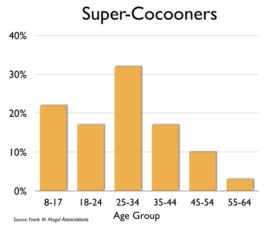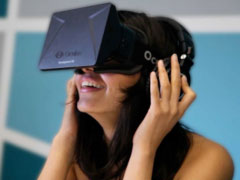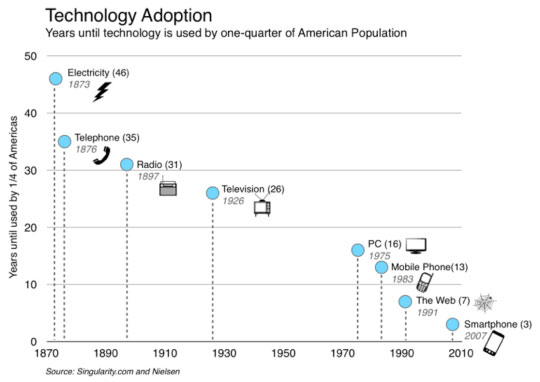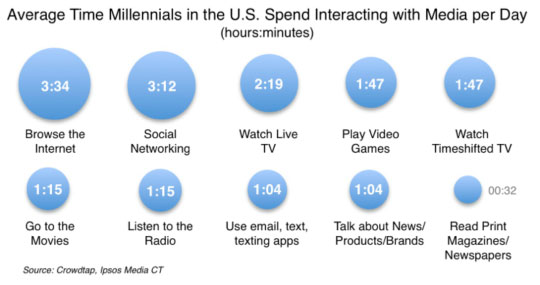
Vol. XIV, No. 2, February-March 2014
- Editor's corner & travelogue
- Why entertainment venues should fear digital technology
- Two Foundations Entertainment Universities on the horizon: one is free and the other has an early bird discount
- Are You Old School?
- Spectator sports growing in popularity & on the decline
- Top design trend - Immersive design
- Back to the basics; the only five ways to grow your business
- Importance of ambiance
- Is bowling in the gutter?
Why entertainment venues should fear digital technology
The New York Times reported in 1876 that a new technology, a telephone-like device invented by Johann Philipp Reis in Germany, could result in people never having to leave their homes again. The story said, "The telephone, by bringing music and ministers into every home, will empty the concert-halls and the churches."

Well, as we all know, that isn't exactly what happened back then. However, 138 years later, digital technology may be doing exactly that, enabling and encouraging us to stay in our homes for what is labeled as super cocooning, and not interact with the real outside world.
Today, you can get just about anything you need without leaving your home while at the same time staying connected with the outside world via digital screens using social media, texting and Skype among others. We have Amazon, now rolling out AmazonFresh to deliver fresh groceries, restaurant home delivery and just about any other product or service available to order on the Internet. Tesco, the British-based supermarket chain, is looking at a project called "Tesco Pele" that will allow consumers to shop in a virtual supermarket where they can pick out and purchase groceries without even leaving their couches.

And just the other day, FaceBook announced its $2.0 billion purchase of Oculus VR Inc., the maker of the virtual-reality headset called Rift. There can be little doubt that Mark Zuckerberg has big plans for virtual-reality to allow his social networking company to move users from its current one-dimension social and game experiences into a new immersive realm of human connectivity. Such technology will not only allow social media to mimic a real world meet-up in a 3-D 360° virtual world, or perhaps in a Second Life type world, but also offer other experiences as Zuckerberg described, "We're going to make Oculus a platform for many other experiences . . . Imagine enjoying a court side seat at a game, studying in a classroom of students and teachers all over the world or consulting with a doctor face-to-face -- just by putting on googles in your home." (read Mark Zuckerberg's entire Facebook post about Rift) And imagine the appeal of playing video games with components anywhere in the world in a realistic immersive 3-dimensional virtual world. Oculus VR co-founder and CEO Brendan Iribe has hinted about Rift virtual vacations: "Imagine putting a 360-camera with audio was well on the top of Mount Everest or a beach in Barcelona." Can a realistic virtual-reality trip to a theme park be far behind? (Also read our article in this issue about immersive experiences)
The pace of technological advances and the changing digital landscape is constantly being accelerated by Moore's Law (an axiom that implies an exponential leap in technological innovations). And the rate at which consumers adopt new technology is also accelerating. It is hard to even imagine what is right around the corner that will make super cocooning even more alluring.

Currently entertainment in the form of video games and pixel-perfect, high definition TVs with 100s of channels and tens of thousands streaming movies, as well as Internet options such as YouTube, are available 24/7 in the comfort and security of our homes, and on the horizon there is virtual-reality. We no longer have to be glued to our lounge chair for any of this, complements of the less than 7-year-old smartphone. And for that minister in your home, which the New York Times alluded to 138 years ago, there are all forms of digitally transmitted spiritual guidance now available.
This technology-enabled, hyper-convenience of never needing to physically experience the outside real world while keeping us connected is a paradox, as it also isolates us. Friends we used to meet and hang out with at some real world location, we now hang out with online. Face-to-face conversations now happen online. It is easier to communicate via the smartphone than to get in a car and drive somewhere to talk to someone in person or dine or play a game with him or her. Commerce, the purchase of goods and services is not longer a human interaction, but rather a digital one.
This hyper-digital 24/7 connectiveness is a way of life for the younger generations and rapidly being adopted by those who have not yet embraced it. In fact, U.S. Millennials (age 18-36) spend an impressive 18 hours using various forms of digital media every day.

As the Times suggested back in 1876, the future may be very different than it is today. It's easy to foresee that the New Normal will become a homebound society with little need to ever leave to visit location-based stores, services, entertainment venues or restaurants, or even scarier, friends.
As a result of this digital transformation of society, Average will no longer work for location-based entertainment (LBE) or any other type location-based business. Pretty good won't do it either. People will no longer drive across town for pretty good. Today, to stay competitive and lure people out of their homes, out of their comfortable and secure cocoons with all its digital entertainment and social options, as well as home delivery of meals, bricks-and-mortar LBEs and restaurants need to up the ante, to raise the bar, offer even more appealing leisure experiences than in the past by making the visit experiences so compelling, such high quality in all aspects, what we call High Fidelity, that they overcome the intensifying seductive siren call of cocooning-enabling digital technology.
Vol. XIV, No. 2, February-March 2014
- Editor's corner & travelogue
- Why entertainment venues should fear digital technology
- Two Foundations Entertainment Universities on the horizon: one is free and the other has an early bird discount
- Are You Old School?
- Spectator sports growing in popularity & on the decline
- Top design trend - Immersive design
- Back to the basics; the only five ways to grow your business
- Importance of ambiance
- Is bowling in the gutter?


